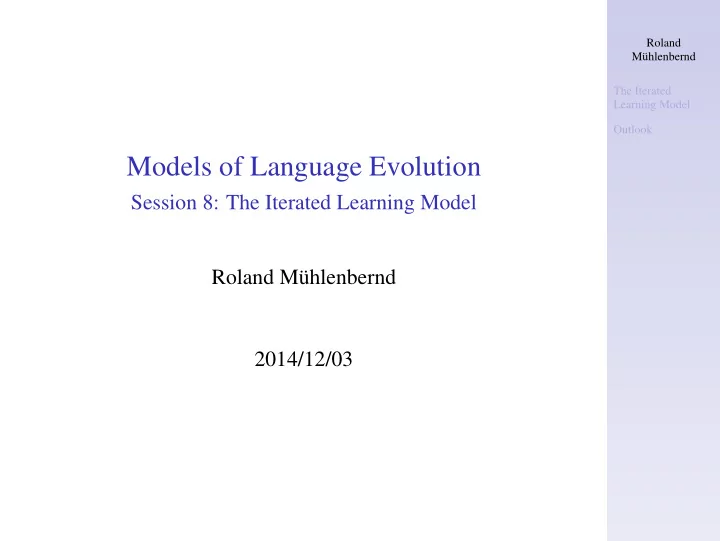

Roland Mühlenbernd The Iterated Learning Model Outlook Models of Language Evolution Session 8: The Iterated Learning Model Roland Mühlenbernd 2014/12/03
The Emergence of Linguistic Structure Roland Mühlenbernd The Iterated Learning Model Outlook “The most basic principle giuding [language] design is not communicative utility but reproduction – theirs and ours... Languages are social and cultural entities that have evolved with respect to the forces of selection imposed by human users. The structure of a language is under intense selection because in its reproduction from generation to generation, it must pass through a narrow bottleneck: children’s minds.” (Deacon, 1997: 110)
Language Emergence on 3 Adaptive Systems Roland Mühlenbernd The Iterated Language is a result of three complex adaptive systems: Learning Model ◮ biological evolution (phylogeny) Outlook ◮ individual learning (ontogeny) ◮ language change/cultural evolution (glossogeny)
The Iterated Learning Model Roland Mühlenbernd The Iterated Learning Model Two forms of representation: Outlook ◮ I-language: I nternal representation as pattern of neural connectivity (more abstract: grammar) ◮ E-language: E xternal representation as actual sets of utterances (all possible grammatical expressions) Two forms of interactions: ◮ language use: I-language → E-language ◮ language learning: E-language → I-language
A Simple ILM Roland Mühlenbernd Example: The Iterated Learner as neural network Learning Model Meanings Outlook ◮ male/female ◮ related/unrelated ◮ older generation ◮ younger generation Signals ◮ p/m ◮ u/a ◮ t/d ◮ a/o Speaker production: s desired = arg max s C ( m | s )
A Simple ILM Roland Mühlenbernd The Iterated Learning Model Outlook 1. initial population: two randomly initializes networks for speaker and hearer each 2. certain number of randomly chosen meanings from 00000000 to 11111111 ( n of 256) 3. speaker produces signals for each of this meanings 4. hearer learns by back-propagation error learning (minimizing an error function) 5. remove speaker, hearer becomes speaker, new hearer is added (with random weights) 6. repeat circle
A Simple ILM: Results Roland Mühlenbernd The Iterated Learning Model Outlook Structured: ◮ p/m → +og/-og ◮ u/a → +yg/-yg ◮ t/d → rel./unrel. ◮ a/o → female/male Unstructured: ◮ pato → (grand)father/uncle ◮ muda → (grand)mother/aunt ◮ pata → young woman ... speaker/learner difference – proportion of covered meaning space
Compositionality & Recursion Roland Mühlenbernd The Iterated Learning Model ◮ Compositionality : A compositional signaling system is Outlook one in which the meaning of a signal is some function of the meaning of the parts of that signal and the way in which they are put together ◮ But: sentence-meaning mapping is not only compositional, but recursive ◮ Digital infinity: potentially infinite use of finite means by constructing syntactic structures that contain structures of the same type ◮ Note: Simple ILM produced compositional (but not recursive) language for the medium-sized learning set
ILM for Recursive Compositionality Roland Mühlenbernd Results: Extended Model The Iterated Learning Model ◮ meaning space: simple variant of Outlook predicate logic ◮ signal space: string of characters ◮ example: loves(mary,john) ↔ “marylovesjohn” ◮ learning method enables the learning/parsing of rules ◮ production mechanism includes innovation
Size & Expressivity of Grammars Roland Mühlenbernd The Iterated Learning Model Outlook
Frequency and Irregularity Roland Mühlenbernd Frequency often correlates with Irregularity: The Iterated ◮ top 10 verbs (Engl.): be, have, do, say, make, go, take, come, see, get Learning Model Outlook Changed Model: ◮ meaning space: (objects with) two properties a and b ◮ meaning probability defined by index: if i > j , then p ( a i ) < p ( a j ) ◮ signal space: string of characters Result: example of emerged language : Note: Hurford (2000) simulates a ILM with a meaning space that combines predicate logic with frequency
Social Transmission favors Generalization Roland Mühlenbernd The Iterated Learning Model Outlook Note: ◮ the strength of coverage of generalization correlates with the survival potential of meaning-form pairs ◮ linguistic generalization is favored by social transmission (iterated learning) ◮ infant drive for internal generalization might be the prime mover in causing regularities in languages ◮ creatures with no such drive at all would produce no historical E-languages with persistent regular patterns
Coevolution in glossogeny and phylogeny Roland Mühlenbernd The Iterated Learning Model Outlook ◮ phylogeny: fitness = capacity to communicate ◮ it is essential for a ‘newcomer’ to adapt to the code of the community ◮ glossogenetic evolution can put a significant drag on phylogenetic adaptation ◮ favorable result: an innate ‘universal grammar’ that is useful for each form of human language ◮ But what is “each form of human language”?
Language Emergence on 3 Adaptive Systems Roland Mühlenbernd The Iterated Language is a result of three complex adaptive systems: Learning Model ◮ biological evolution (phylogeny) Outlook ◮ individual learning (ontogeny) ◮ language change/cultural evolution (glossogeny)
Timescale of Literature Roland Mühlenbernd 1990 Pinker & Bloom: language evolution theory 1991 The Iterated 1992 Learning Model 1993 Outlook 1994 1995 Bickerton: PL-fossils in form of language behavior 1996 1997 1998 1999 Jackendoff: PL-fossils , Nowak & Krakauer: The Evolution of Language 2000 2001 2002 Kirby, Hurford: The Emergence of Linguistic Structure 2003 2004 Jäger: Evolutionary Game Theory for Linguists. A primer 2005 2006 2007 Bickerton: perspective from linguistics , Kirby: LE-modelers perspectives 2008 Jäger: Applications of Game Theory in Linguistics 2009 2010 2011 2012 2013 2014 Mühlenbernd & Franke: Meaning, Evolution, and the Structure of Society
Recommend
More recommend